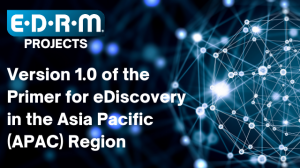
EDRM Publishes Version 1.0 of the Primer for eDiscovery in the Asia Pacific Region
MINNEAPOLIS, MN, USA, March 2, 2022 /EINPresswire.com/ -- Setting the global standards for e-discovery, the Electronic Discovery Reference Model (EDRM) is pleased to announce Version 1.0 of the Primer for eDiscovery in the Asia Pacific (APAC) region, November 2021.
EDRM develops and promotes thought leadership, frameworks and best practices in e-discovery, with its engaged global community comprised of knowledgeable, multidisciplinary professionals. EDRM contributors continue to enhance e-discovery, privacy, security and information governance frameworks, processes and standards.
Susan Bennett, Project Trustee and Principal Drafter, led a global team to create a primer on eDiscovery in the APAC region. Originally chartered by The Sedona Conference®, EDRM is honored to publish this primer at the request of the project team and Sedona. EDRM plans to webify the content and provide pages for each country, much like the interactive state rules for the next version of the primer. Updates are very welcome for this Version 1.0, and we offer the document in its entirety for Public Comment through March 15, 2022.
“The goal of the Primer is to help foreign practitioners involved in legal proceedings in APAC to understand the different discovery requirements in each of the countries covered” said Susan Bennett, Principal of Sibenco Legal & Advisory, Founder of InfoGovANZ and Project Trustee and Principal Drafter. “I would especially like to thank each of the drafters who have given their time to create this valuable resource for other practitioners. I hope it will inspire others to get involved to expand the Primer with the addition of further countries and content.”
The following countries were researched and written by these drafters: Australia, Maureen Duffy; China, Jared T. Nelson and Tom S. Groom; India, Sandeep Jadav; Japan, Sebastian Ko and Daryl Osuch; Hong Kong, Sebastian Ko; Korea, David Kang; Malaysia, Gita Radhakrishna; New Zealand, Maureen Duffy and Andrew King; and Singapore, Gita Radhakrishna.
“This primer provides concise summaries of the judicial systems in each of the covered countries, together with more detail on discovery rules, privilege law, privacy issues, and cross-border discovery considerations,” said David R. Cohen, partner at Reed Smith and chair of the EDRM Project Trustees. “If you are invoved in disputes in the covered Asian countries--or litigation in the U.S. that may implicate discovery of information from Asia-- this is the first place I would recommend looking to start learning what you need to know.”
“Susan Bennett’s team has created a highly valuable resource for our EDRM community,” said Mary Mack, EDRM CEO and chief legal technologist. “We are grateful to The Sedona Conference® and the project team for the opportunity to publish Version 1.0 for public comment, and we invite others to comment on the existing content and create additional material for countries not yet represented.”
The EDRM community, comprised of 33% corporations, 30% law firms and 23% software and service providers, 12% governments with the remaining 2% being a mix of educators, students, judges and media in 136 countries spanning six continents.
About the APAC eDiscovery Primer Project
eDiscovery practices and procedures in the Asia Pacific (APAC) region vary greatly depending on the origins of a given jurisdiction’s legal system. Countries with common law systems, such as Australia, New Zealand, Hong Kong and Singapore, have well-established eDiscovery practices and procedures in their respective court rules. In jurisdictions based on civil law or hybrid legal systems orders and/or directions for discovery are less common. However, discovery processes in the APAC region are commonly used in international arbitrations, for document production pursuant to notices or subpoenas to produce documents in foreign regulatory investigations, and for internal investigations.
Susan Bennett, Project Trustee and Principal Drafter, led a global team to create a primer on eDiscovery in the APAC region. Originally chartered by The Sedona Conference®, EDRM is honored to publish this primer at the request of the project team and Sedona. EDRM plans to webify the content and provide pages for each country, much like the interactive state rules for the next version of the primer. Updates are very welcome for this Version 1.0, and we offer the document in its entirety for Public Comment through March 15, 2022.
About EDRM
Empowering the global leaders of e-discovery, the Electronic Discovery Reference Model (EDRM) creates practical resources to improve e-discovery, privacy, security and information governance. Since 2005, EDRM has delivered leadership, standards, tools, guides and test datasets to improve best practices throughout the world. EDRM has an international presence in 136 countries and growing and an innovative support infrastructure for individuals, law firms, corporations and government organizations seeking to improve the practice and provision of data and legal discovery. Learn more about the EDRM today at EDRM.net.
EDRM Media Contact
Kaylee Walstad
Chief Strategy Officer, EDRM
+ +1 612-804-3244
email us here
Visit us on social media:
Twitter
LinkedIn
EIN Presswire does not exercise editorial control over third-party content provided, uploaded, published, or distributed by users of EIN Presswire. We are a distributor, not a publisher, of 3rd party content. Such content may contain the views, opinions, statements, offers, and other material of the respective users, suppliers, participants, or authors.



